No Room for the Gentleman Amateur
From The American SpectatorInteresting that a new musical version of Mel Brooks’s Young Frankenstein and a comic stage adaptation of Alfred Hitchcock’s film of The Thirty-nine Steps, should have arrived on Broadway in the same season. Plays, let alone musicals, based on movies are still a relatively recent phenomenon, and these two are reminders of the extent to which they are characteristic of the post-modern sensibility — also, perhaps, of the extent to which movies are inherently comical artifacts, and never more so than when they try to be serious. Not, of course, that Young Frankenstein ever tried to be serious. It is even arguable that Hitchcock’s version of John Buchan’s novel didn’t either. Probably no one saw it as a comedy when it was released in 1935 — even though it does have some fine comic dialogue — but it was so different from the novel and so accentuated the novel’s most fantastical elements that some must have seen it as a travesty. Buchan himself is supposed to have said that Hitchcock had “improved” his novel, for whatever that is worth.
If, to my admittedly suspicious eye, Hitchcock hints at mockery of World War I-era ideas of heroism and honor, it’s because these things were much-mocked by the 1930s. But Buchan’s heroic narrative had itself seemed quite daring and even a little vulgar when it was published in 1915. Here is what the author wrote in his dedication of the book to his friend and fellow serving officer of the British army, Tommy Nelson. “You and I have long cherished an affection for that elementary type of tale which Americans call the ‘dime novel,’ and which we know as the ‘shocker’ — the romance where the incidents defy the probabilities, and march just inside the borders of the possible.” This, in other words, was the disreputable children’s literature of its day, or bordering on it. Remember the contrived alarmism (“Trouble in River City!”) of Professor Harold Hill in The Music Man about the “dime novel hidden in the corn-crib” along with the would-be delinquent farm-boy’s copy of Captain Billy’s Whizz-Bang and his cubeb cigarettes?
The key words of Buchan’s dedication, and those which save him from premature post-modernism, are “just inside the borders of the possible.” Certainly, he had no ambition to be ridiculous, and that is more than you can say for the latter-day stage adaptation, successor to a London production that won the Olivier Award last year for best new comedy. It advertises itself as “a hilarious whodunit, part espionage thriller and part slapstick comedy.” The New York Times reviewer compared its version of Buchan’s hero, Richard Hannay, to Dudley Do-Right of the Mounties from the old Bullwinkle show. True enough, perhaps, though he might also have mentioned that the Dudley Do-Right parody of heroism has now become almost all that we have left of the hero. When we watch the parody, we are really watching someone else watch it with us — a much more naive person who may be a version of our younger selves and who is still trying to take all that stuff about heroism seriously. It is this phantom watcher or innocent Doppelgänger whom we are really laughing at in the parts that are slapstick comedy. We know better!
Odd then, isn’t it, that we seem to have to keep reminding ourselves of the fact by deriving such amusement from that shadowy youngster’s pathetic naiveté? So much of our theatre today, like our movies, is this kind of warning to us not to allow our knowing, up-to-date, sophisticated selves to be seduced by what so much of our theatre and movies used to consist of up until thirty or forty years ago. You’d think we’d have gotten the message by now. I’ve just come from the Shakespeare Theatre of Washington’s production of Argonautika, a very clever, Julie Taymore-type adaptation by Mary Zimmerman of the classical legend of Jason and the Argonauts. Guess what? It’s a hilarious whosailedit, part fleece-grabbing thriller and part slapstick comedy. Actually, it’s mostly slapstick comedy, with a moral tacked on at the end warning us of the ultimate futility of all heroic ambitions.
The futility implies the comedy, doesn’t it? Watching a hero today is rather like watching Laurel and Hardy move a piano or The Three Stooges paint a house. We know he’s going to screw up, and that prepares us to laugh. Or else, like Rambo in the new film that Sylvester Stallone finally got around to calling by the name of his eponymous hero, he succeeds — which is even funnier. Culturally prepared to see heroic deeds taking place outside the borders of the possible, we are thus relieved of any pangs of artistic conscience when they are as far outside those borders as they are in the case of cartoon heroes like Rambo. Even he tells us more than once that heroism isn’t going to make any difference. That’s before he cuts off the head of a machine-gunner with a single swipe of his self-forged machete, leaps into the man’s vehicle and single-handedly mows down what looks to be about a brigade of Burmese baddies, putting everything to rights in a twinkling. Yeah, well. He lied.
If Buchan was not unaware of his own brushes with absurdity or fantasy, he was also never less than serious in his approach to the character of Richard Hannay, whom he brought back again in four subsequent novels. Hannay was the very model of that beau ideal of the Edwardian Englishman, the gentleman amateur. He was not a soldier, but he had lived like a soldier — as a mining engineer in South Africa — and was accustomed to physical hardship and danger; he was not a spy or a politician, but he instinctively understood the way that spies and politicians operated. In cracking the novel’s German spy-ring, he went straight from being a fugitive from both the spies and the police to advising cabinet ministers and directing police operations.
This is what differentiates him from Hitchcock’s hero, played by Robert Donat, who remains an outsider. The last glimpse we have of him shows the handcuffs still dangling from his wrist as he reaches for his love interest (Madeleine Carroll) — who, naturally, does not exist in Buchan. This was the aspect of him that most appealed to Hitchcock, and the nattily turned-out Donat was an early prototype of Cary Grant in North by Northwest (1959) — as the stage adaptation of The Thirty-nine Steps recognizes by alluding to the later film. Both Donat and Grant, no matter how desperate their plight, always look the same — as if they had just stepped out of a men’s fashion magazine. That’s the Dudley Do-Right touch. As someone once said, the real hero of North by Northwest was Cary Grant’s suit. Robert Donat wore an earlier version of it in The Thirty-nine Steps, where we once or twice see him with a forelock dripping down his forehead but otherwise never with a hair of his magnificent pompadour out of place.
The point of sending Buchan’s Hannay on the run, by contrast, was to establish his protean nature, his ability to disguise himself so cleverly that even someone who knows him can’t detect him. He’s not always the same; he’s always different. He can be anyone he needs to be in order to bring to book a gang of devilish Huns with a similar talent. At the climax of the novel, when he has got them dead to rights, the Germans almost manage to slip away by their ability to appear as perfectly ordinary Englishmen on holiday. That’s why Edward Rothstein, also writing in The New York Times, has got it exactly wrong when he says that Hitchcock is “unlike Buchan” in stressing the theatrical element in the spy game. This is true only if by “theatrical” you mean “obviously fake.” Neither a successful spy nor a gentleman amateur like Hannay looks fake because he’s so good at dressing up — as Buchan’s hero but not Hitchcock’s does to spectacular effect as a poor road-mender in Scotland.
Gentlemen-amateurs, I suppose, are now nearly as much figures of fun as heroes are — and, I think for the same reason. For both are reproaches to men, and in particular to their sense of completeness as men. They are reminders of all those things that, because we have taught ourselves that it is wrong or impossible for anyone to expect them of us, we have left out of our makeup. Buchan was, perhaps, saying the same thing in a different way in his tribute to Tommy Nelson (in These for Remembrance) after he had been killed by a German artillery shell at Arras in 1917. “In the case of others we might regret the premature loss to the world of some peculiar talent; with Tommy we mourned especially the loss of a talent for living worthily and for helping others to do likewise.”
Discover more from James Bowman
Subscribe to get the latest posts to your email.







